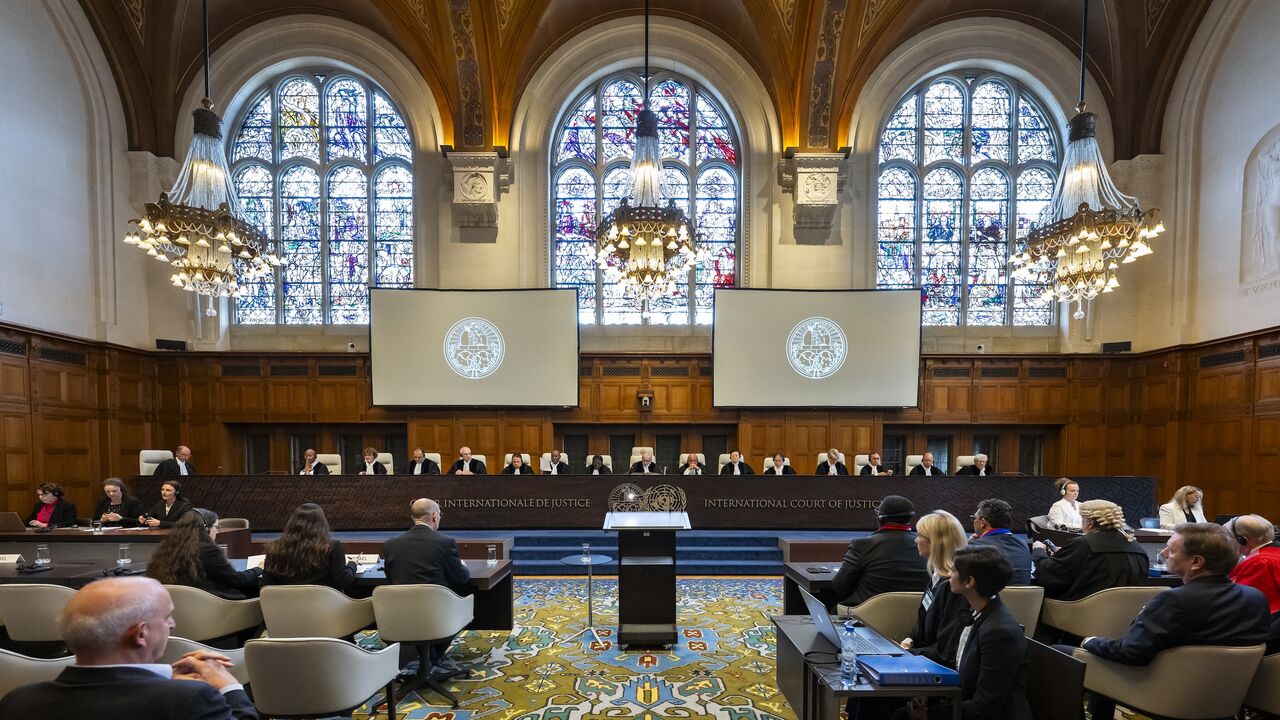Top UN court rules Israel’s presence in Palestinian territories illegal
Israel slammed the decision by the International Court of Justice, which held the occupation of Palestinian territories illegal and said it must cease immediately, including the evacuation of Jewish settlers.

In an advisory opinion requested by the UN General Assembly, the International Court of Justice in The Hague said Friday that Israel’s continued presence in the Palestinian territories — the West Bank, East Jerusalem and Gaza — is illegal and should end “as rapidly as possible.”
By a vote of 14-1, the ICJ determined, “The presence of Israel in the Palestinian territory is unlawful.” Nawaf Salam, the court's president, added, “The court is of the opinion that the state of Israel is under the obligation to cease immediately all settlement activities and to evacuate all settlers from the occupied Palestinian territory.”
Salam also said that Israel is obligated to “make reparation for the damage caused to all natural or legal persons concerned in the occupied Palestinian territory.” The ruling holds that Israel has been illegally confiscating Palestinian lands and demolishing Palestinian homes in East Jerusalem as an occupation policy.
Israeli Prime Minister Benjamin Netanyahu slammed the ruling, saying, “The Jewish people are not occupiers in their own land — not in our eternal capital Jerusalem, not in the land of our ancestors in Judea and Samaria [the West Bank].” He further said, “No false decision in The Hague will distort this historical truth, just as the legality of Israeli settlement in all the territories of our homeland cannot be contested.”
National Unity leader Benny Gantz criticized the ruling, stating, “It is yet another testament to external interference that is not only both counterproductive to regional security and stability and overlooks the massacre of October 7th and terror from Judea and Samaria, but serves as another example of the ‘judicialization’ of a political conflict.”
Israeli opposition chairman Yair Lapid of Yesh Atid also condemned the ruling, posting to X, “The opinion of court in The Hague is disconnected and one-sided. It is tainted with anti-Semitism and lacks understanding of the reality on the ground. It only serves Islamic terrorism and the campaign against Israel.” He further said the court’s decision makes for yet another “political failure of a dysfunctional [Israeli] government,” adding that the opposition will mobilize “to prevent the ruling from being accepted by UN institutions and member states.”
A non-binding advisory opinion
The ICJ determination follows a vote by the General Assembly in 2022 to request an advisory opinion on the legality of Israel’s occupation of Palestinian territory. The request was submitted in response to the Palestinian mission to the UN, led by the Palestine Liberation Organization (PLO), asking for an assessment of whether the occupation could be defined as temporary. International law recognizes occupation as legal under certain circumstances, but only if it is temporary, that is, has not been transformed into a permanent annexation of territories.
Eighty-seven countries — including Egypt, Jordan, Qatar, Saudi Arabia and the United Arab Emirates — supported the Security Council's decision to seek an advisory opinion, with 23 countries — including Germany, Israel, the United Kingdom and the United States — opposed. Fifty-two countries abstained.
In February, the ICJ held several days of hearings on the issue, with representatives of various countries presenting their positions. A delegation from the Israeli Foreign Ministry attended the hearings, but did not directly participate. Rather, the delegation contacted countries considered friendly to Israel in an attempt to influence the outcome.
Critics of Israel claimed that it could no longer be argued that the Israeli occupation is temporary given 57 years of Israeli control over the West Bank, East Jerusalem, and Gaza; the constant expansion of settlements and increase in Jewish settlers; and calls by Israeli ministers to annex the West Bank and their opposition to the establishment of a Palestinian state.
Israel, on the other hand, asserted that the Oslo Accords (1993), which it signed with the PLO, consider Israel's governance of the West Bank an interim phase and, hence, temporary.
Significant ramifications for Israel
Tamar Megiddo, a senior lecturer at the Hebrew University of Jerusalem who specializes in international law, told Al-Monitor that although the advisory opinion is nonbinding, the ICJ is the most important judicial body chartered by the United Nations. “As such,” she said, “its conclusions, very difficult for Israel, are not to be taken lightly.”
“The court said that Israel is in breach of its obligations as an occupying force to the point that its presence in the area has become illegal and that it is acting to annex territories. The court further said Israel has in fact annexed East Jerusalem, and some parts of the West Bank, [and] that it infringes international law on racial segregation. So definitively, [it is] a very critical advisory opinion vis-a-vis Israel,” Megiddo assessed.
“Some of the assertations of the court were probably to be expected, and did not come as a surprise, but there were also some determinations that were very severe, especially saying that Israel must end its presence in the area and that it must evacuate all the settlers,” she said. “The court also told other countries and the UN that they must bring about the ending of Israel’s violations of international law. Such a statement is significant, especially when Israel is in the midst of war in Gaza.”
Megiddo noted that the ICJ opinion can create difficulties for countries that cooperate with Israel on security issues because the court determined that other parties cannot in any way contribute to the perpetuation of an Israeli presence in the Palestinian territories. For instance, the opinion could affect arms deliveries. It could also be translated into sanctions against Israel and decisions against Israel in the UN General Assembly and the Security Council.
The court, Megiddo further explained, does not recognize the 2005 Israeli disengagement from Gaza as ending the occupation there, because Israel maintains certain parameters of occupation — such as control of Gaza's borders via land, sea and air.
“This affirmation [of Gaza's status] has far-fetching significance, because it affects Israel’s ability to say it was acting out of self-defense after the Oct. 7 attack by Hamas,” Megiddo said. She believes Israel's defense of itself will be much more challenging in the ICJ's ongoing deliberations on the complaint submitted in December 2023 by South Africa claiming that Israel is carrying out genocidal acts in Gaza.







